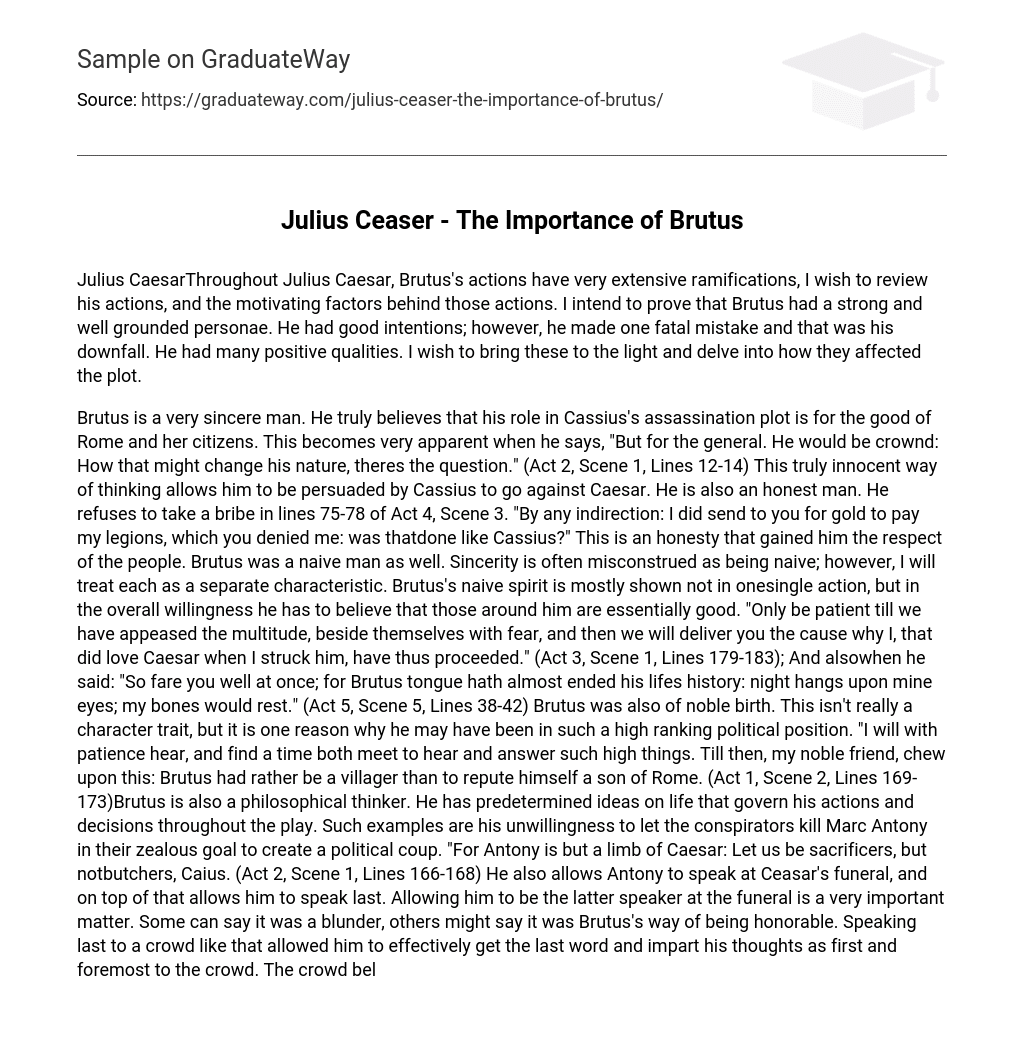In Julius Caesar, Brutus’s actions have far-reaching consequences. I want to examine his actions and the reasons behind them. My goal is to show that Brutus had a strong and rational character. He had good intentions, but one major mistake led to his downfall. He possessed numerous positive qualities which I want to highlight and explore their impact on the story.
Brutus, a sincere and honest man, genuinely believes that his involvement in Cassius’s plot to assassinate Julius Caesar is for the benefit of Rome and its citizens. This belief is evident when he expresses, “But for the general.He would be crownd: How that might change his nature, theres the question” (Act 2, Scene 1, Lines 12-14). Despite being persuaded by Cassius to go against Caesar, Brutus refuses to take a bribe. He states, “By any indirection: I did send to you for gold to pay my legions, which you denied me: was that done like Cassius?” (Act 4, Scene 3, Lines 75-78). His honesty earns him the respect of the people.
While sincerity is often mistaken for naivety, Brutus exhibits both qualities separately. His naivety is mostly demonstrated through his willingness to believe that those around him are essentially good. He says,”Only be patient till we have appeased the multitude,beside themselves with fear,and then we will deliver you the cause why I ,that did love Caesar when I struck him ,have thus proceeded”(Act3.Scene1.Lines179-183) . Additionally,in Act5.Scene5.Lines38-42 he remarks that his life is coming to an end and expresses his noble birth by stating,”So fare you well at once;for Brutus tongue hath almost ended his life’s history : night hangs upon mine eyes ;my bones would rest.” This text highlights why Brutus held a high political position.In Act 1, Scene 2, Lines 169-173, Brutus demonstrates his willingness to patiently listen and respond to important matters. Throughout the play, Brutus’s philosophical thinking guides his actions. For example, in Act 2, Scene 1, Lines 166-168, he decides not to kill Marc Antony alongside the conspirators. Moreover, at Caesar’s funeral, Brutus allows Antony to speak and speaks last. This decision can be seen as either a mistake or an honorable act. By speaking last, Brutus effectively conveys his thoughts and potentially changes the crowd’s beliefs in the conspirators’ cause by influencing their perspective. In Act 3, Scene 1: Lines 175-179 Cassius assures Brutus that his voice carries as much power as anyone’s when it comes to assigning new positions. Another instance where Brutus defends his beliefs is during the battle of Phillipi where he takes a significant risk.This choice can be interpreted as either wise or unwise depending on one’s point of view; nevertheless it showcases Brutus’ convictions and how he staunchly defended them until the end.
Initially, I held the belief that Brutus was an unsuitable character for the role Shakespeare gave him. Nevertheless, I quickly realized that Brutus truly embodies moral strength, as previously explained. The plot mainly centers on Brutus, making his actions open to examination and crucial to understand. Ultimately, Brutus represents honor and should be acknowledged for it.





